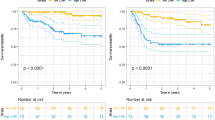Abstract
C-reactive protein (CRP) is an acute-phase reactant that is a promising biomarker in patients with cancer of many kinds. The aim of this retrospective study was to evaluate significant changes in CRP levels as a parameter for the response effect and long-term survival of patients with diffuse large B cell lymphoma (DLBCL). Serum CRP data were collected in 94 patients with DLBCL from October 2006 to August 2009 in Cancer Center, Sun Yat-Sen University. Results were correlated with clinical data. The median CRP serum level in patients with DLBCL was 30.91 ± 53.35 in male and 22.39 ± 29.89 mg/L in female. Base line CRP levels were correlated with International Prognostic Index (IPI) scores (p = 0.03). Among the patients with an IPI score of 1–2, base line CRP levels were correlated with long-term survival (p = 0.001). Base line CRP levels were also correlated with OS (p = 0.001) and varied with different clinical stages (p = 0.03). The corresponding CRP levels in the patients with 2 cycles of chemotherapy were correlated with short-term treatment response (p = 0.003) and OS (p = 0.04) or TTP (p = 0.03). CRP serum levels can be used as additional prognostic parameter in patients with diffuse large B cell type lymphoma.


Similar content being viewed by others
References
Marnell L, Mold C, Du Clos TW. C-reactive protein: ligands, receptors and role in inflammation. Clin Immunol. 2005;117:104–11.
Hoffmann JA, Kafatos FC, Janeway CA, Ezekowitz RA. Phylogenetic perspectives in innate immunity. Science. 1999;284:1313–8.
Deodhar SD. C-reactive protein: the best laboratory indicator available for monitoring disease activity. Cleve Clin J Med. 1989;56:126–30.
Paffen E, DeMaat MP. C-reactive protein in atherosclerosis: a causal factor? Cardiovasc Res. 2006;71:30–9.
Eberhard OK, Langefeld I, Kuse ER, et al. Procalcitoninin in the early phase after renal transplantation—will it add to diagnostic accuracy? Clin Transplant. 1998;12:206–11.
Crumley AB, McMillan DC, McKernan M, Going JJ, Shearer CJ, Stuart RC. An elevated C-reactive protein concentration, prior to surgery, predicts poor cancer-specific survival in patients undergoing resection for gastroesophageal cancer. Br J Cancer. 2006;94:1568–71.
Hashimoto K, Ikeda Y, Korenaga D, et al. The impact of preoperative serum C-reactive protein on the prognosis of patients with hepatocellular carcinoma. Cancer. 2005;103:1856–64.
Kodama J, Miyagi Y, Seki N, et al. Serum C-reactive protein as a prognostic factor in patients with epithelial ovarian cancer (1999). Eur J Obstet Gynecol Reprod Biol. 1999;82:107–10.
Nakanishi H, Araki N, Kudawara I, et al. Clinical implications of serum C-reactive protein levels in malignant fibrous histiocytoma. Int J Cancer. 2002;99:167–70.
Lossos IS, Morgensztern D. Prognostic factors in diffuse large B cell lymphoma: present and future. Am Soc Clin Oncol. 2007;1092-9118/07/496-501.
Erlinger TP, Platz EA, Rifai N, Helzlsouer KJ. C-reactive protein and the risk of incident colorectal cancer. JAMA. 2004;291:585–90.
Shimada H, Nabeya Y, Okazumi S, et al. Elevation of preoperative serum C-reactive protein level is related to poor prognosis in esophageal squamous cell carcinoma. J Surg Oncol. 2003;83:248–52.
Heikkila K, Ebrahim S, Lawlor DA. A systematic review of the association between circulating concentrations of C reactive protein and cancer. J Epidemiol Commun Health. 2007;61:824–32.
Hefler LA, Concin N, Hofstetter G, et al. Serum C-reactive protein as independent prognostic variable in patients with ovarian cancer. Clin Cancer Res. 2008;14(3):710–4.
Stephan Polterauer S, Christoph Grimm C, Clemens Tempfer C, et al. C-reactive protein is a prognostic parameter in patients with cervical cancer. Gynecol Oncol. 2007;107:114–7.
Khandavilli SD, Ceallaigh P, Lloyd CJ, et al. Serum C-reactive protein as a prognostic indicator in patients with oral squamous cell carcinoma. Oral Oncol. 2009;45:912–4.
Legouffea E, Rodriguez C, Picgtc MC. C-reactive protein serum level is a valuable and simple prognostic marker in non Hodgkin’s lymphoma. Leuk Lymphoma. 1998;31(3–4):351–7.
Khalifa KA, Alkilani AA, Ismail H. Evaluation of some biochemical markers as prognostic factors in malignant lymphoma. J Egypt Nat Cancer Inst. 2006;20(1):47–54.
Sergei IG, Florian RG, Michael K. Immunity, inflammation, and cancer. Cell. 2010;140(6):883–99.
Herishanu Y, Perry C, Braunstein R. Early-mid treatment C-reactive protein level is a prognostic factor in aggressive non-Hodgkin’s lymphoma. E J Haematol. 2007;79(2):150–4.
Koukourakis MI, Kambouromiti G, Pitsiava D, Tsousou P, Tsiarkatsi M, Kartalis G. Serum C-reactive protein (CRP) levels in cancer patients are linked with tumor burden and are reduced by anti-hypertensive medication. Inflammation. 2009;32(3):169–75.
Gage JR, Fonarow G, Hamilton M, Widawski M, Martínez-Maza O, Vredevoe DL. Beta blocker and angiotensin-converting enzyme inhibitor therapy is associated with decreased Th1/Th2 cytokine ratios and inflammatory cytokine production in patients with chronic heart failure. Neuroimmunomodulation. 2004;11:173–80.
Lee CC, Adler AI, Sandhu MS, Sharp SJ, Forouhi NG, Erqou S, Luben R, Bingham S, Khaw KT, Wareham NJ. Association of C-reactive protein with type 2 diabetes: prospective analysis and meta-analysis. Diabetologia. 2009;52(6):1040–7.
Gortney JS, Sanders RM. Impact of C-reactive protein on treatment of patients with cardiovascular disease. Am J Health Syst Pharm. 2007;64:2009–16.
Schmeisser A, Soehnlein O, Illmer T, Lorenz HM, Eskafi S, Roerick O, Gabler C, Strasser R, Daniel WG, Garlichs CD. ACE inhibition lowers angiotensin II-induced chemokine expression by reduction of NF-kappaB activity and AT1 receptor expression. Biochem Biophys Res Commun. 2004;325:532–40.
Acknowledgment
We thank for the generous help in the linguistic review from Chuan Shen, Ph.D. in Dana-Farber Cancer institute and Harvard Medical School and Dongrong Situ, M.D. in Sun Yat-sen University Cancer Center. This work was supported by the National Natural Science Foundation of China Grant 30500610, Talents Training Program of Sun Yat-sen University, and National “Eleventh Five” technology major projects—Clinical evaluation of new drug technology platform 2008ZXO9312-002.
Author information
Authors and Affiliations
Corresponding author
Additional information
Ye Cao and Yan-xia Shi contributed equally to this work.
Rights and permissions
About this article
Cite this article
Cao, Y., Shi, Yx., Chen, Jo. et al. Serum C-reactive protein as an important prognostic variable in patients with diffuse large B cell lymphoma. Tumor Biol. 33, 1039–1044 (2012). https://doi.org/10.1007/s13277-012-0337-z
Received:
Accepted:
Published:
Issue Date:
DOI: https://doi.org/10.1007/s13277-012-0337-z




